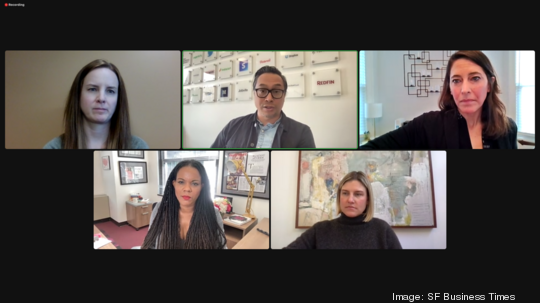
While OpenComp sells software for companies to assess pay equity, it's asking its customers — and the startup sector at large — to do more.
On Tuesday it launched the Organizations for Pay Equity Now Imperative, or OPEN Imperative, a coalition of startups, venture firms and other high-growth companies that want to close wage gaps. Initially, the effort is focused primarily on pre-IPO businesses but membership is open to any organization globally.
Their more than 200 founding members include Bay Area companies like Imply.io (Burlingame), Prodly (Palo Alto), Argona Partners (Mountain View), Nia Impact Capital (Oakland), Mission Bio (South San Francisco) and several San Francisco companies, including Landed, Near, Divvy, MentalHappy, Panther and Nextdoor.
"Pay equity is a critical part of doing right by our team, over 60% of whom identify as female. Start-ups have to take steps to commit to equity from the start if they want it baked into their corporate DNA for the long-haul," Landed President Alex Lofton told me via email. "As a founder, I think it’s critical for us to do everything we can to foster a company culture centered on equity in the early days, and that that culture remains even as we continue to grow and scale the business."

In its first year, the coalition wants to grow its membership to 5,000 companies, and current members have committed to collectively reducing their average gender wage gap by 60%. Within five years, they want to eliminate wage gaps at startups. It's an effort that will require using data that can then be translated into actionable goals.
OpenComp also released a study on Tuesday that shows a disconnect between what employers say and do on pay equity at high-growth companies in the U.S. with fewer than 500 employees.
They surveyed 500 business leaders online in early February. Around two-thirds of business leaders said they believed pay equity was important for recruiting and retaining employees, but nearly as many also felt that they don't have the resources to do something about it.
It’s easy to put out a press release about being committed to equity during Women’s History Month, for example, but it’s much harder to implement cultural change that will produce results.
The biggest barriers to implementation are access to compensation data, leadership buy-in and time, according to the study.
That’s why the OPEN Imperative coalition is focusing its efforts on startups. It’s in the earlier stages of a company when founders have an opportunity to set the tone and bake in an expectation for equity.
So, in order to affect change, what should an executive or founder do? OpenComp hosted a panel discussion for media on Monday to explore these issues.

One of the first, and perhaps most difficult, things to do is look internally and evaluate an organization’s current compensation data to set a benchmark. You can’t change it if you don’t measure it.
“Higher pay is what women want right now when they are engaging a new employer, and so that’s driving wages up. It’s slightly closing the gap but it doesn’t erase the gap,” said C. Nicole Mason, president and CEO of the D.C.-based Institute for Women's Policy Research. “Businesses are being nudged by public policies but also businesses are saying, you know, hey, we should be taking a harder look at this and examining our compensation and pay schemes and making sure that it’s equitable. And also know that it makes good business sense… It’s really a win-win.”
There’s really no good reason to wait on tackling this issue, either.
“Get ahead of it, do it before you have to. There’s a reason those things exist and we’ve seen a lot of benefit from, for example, in Illinois you can’t ask for someone’s current pay,” said Sarah Rigsbee, the CFO of Chicago-based startup Farmer’s Fridge. "The more that you can remove small questions or little biases from the process, the better.”
Another tangible change that can have an immediate impact is eliminating salary negotiations and replacing that with a set pay structure.
“If somebody has a different expectation that’s lower, we’re pulling them up either way,” OpenComp co-founder and CEO Thanh Nguyen said, and ”from a finance perspective, it’s already budgeted anyways.”
Sometimes executives hesitate to start an equity initiative until they’ve hired a chief people officer, but that’s a surefire way to punt accountability.
As I reported in November, the CEO sets the tone on these issues. And there’s a small but growing trend of public companies tying executive compensation to measurable outcomes on DEI and ESG goals, often tied to an annual cash bonus.
The panelists all agreed that this is an effective lever to hold CEOs accountable, but startups typically don’t have similar compensation structures as public companies, the latter of which often have annual cash bonuses as incentives for C-level executives to meet certain benchmarks.
Perhaps venture firms could create a different type of incentive for startups.
“I think one of the things that would be really powerful is if we started seeing how this impacts private company valuations and fundraising ability. I think that’s maybe nearer and dearer to a CEO’s heart than a 20% or 30% bonus,” said Katie Hughes, a partner and head of executive talent at General Catalyst. ”That’s incumbent upon the investment community to really think about, right? What premium we’re willing to place for companies that we see are actually taking steps here.”
While not exactly a cash bonus, valuations are tied to stock options and that’s something every founder cares about when thinking about an exit.







